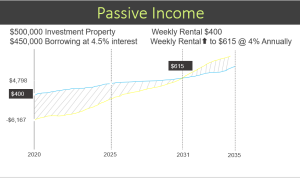The Benefits of Investing in Rental Properties opens the door to a world of financial opportunity and stability. For many, rental properties represent a solid investment strategy, allowing individuals to generate passive income while building equity over time. This approach not only diversifies one’s portfolio but also provides the potential for substantial long-term returns, making it an appealing option for both seasoned investors and newcomers alike.
Understanding the fundamentals of rental property investment is crucial. From selecting the right location to managing tenants effectively, there are numerous factors to consider that can significantly impact the success of your investment. As we explore the many benefits associated with rental properties, you’ll discover how they can be a transformative addition to your financial strategy.
In today’s fast-paced world, where technology advances at an unprecedented rate, the need for effective communication and understanding among individuals has never been more crucial. The way we interact, share ideas, and convey emotions can significantly influence our personal and professional lives. This article delves into the importance of communication, its various forms, and tips to enhance your communication skills in both everyday situations and workplace environments.First, let’s define what communication truly is.
At its core, communication is the process of exchanging information, thoughts, and feelings between individuals or groups through verbal, non-verbal, written, or visual means. It encompasses everything from casual conversations with friends to formal presentations in a business setting. The ability to communicate effectively is vital; it not only enables us to share our perspectives but also fosters understanding and cooperation among diverse groups of people.### The Different Forms of Communication
1. Verbal Communication
This is perhaps the most recognizable form of communication and involves the spoken word. Verbal communication can be either formal or informal and includes face-to-face conversations, phone calls, and video conferences. It’s essential to convey your message clearly and confidently, as tone, pitch, and pace can greatly affect how your message is received.
2. Non-Verbal Communication
Often referred to as body language, non-verbal communication includes facial expressions, gestures, posture, and eye contact. These non-verbal cues can provide context to verbal messages and sometimes convey more than words alone. For instance, a smile can indicate friendliness and openness, while crossed arms may signal defensiveness or discomfort.
3. Written Communication
This encompasses emails, reports, memos, and text messages. Written communication allows for thoughtfulness and precision, as it gives you the opportunity to edit your message before sending it. However, it can also lead to misunderstandings if not crafted carefully. The absence of vocal tone and body language means that the writer must be particularly clear in their word choice and structure.
4. Visual Communication
This type involves the use of visual aids like charts, graphs, images, and videos. Visual communication can enhance understanding by providing visual representations of complex information. It’s widely used in presentations and educational contexts to make information more engaging and accessible.### The Importance of Effective CommunicationEffective communication is the cornerstone of successful relationships, whether personal or professional. Here are several reasons why honing your communication skills is essential:
Building Relationships
Good communication fosters trust and understanding, which are key to any healthy relationship. By expressing yourself clearly and listening actively, you can create stronger connections with others.
Enhancing Collaboration

In a workplace setting, communication is vital for teamwork. Clear communication helps team members share ideas, discuss challenges, and coordinate efforts to achieve common goals.
Avoiding Misunderstandings
Many conflicts arise from miscommunication. By striving for clarity in your conversations and written communication, you can minimize the likelihood of misunderstandings and the resulting frustration.
Increasing Productivity
Effective communication leads to greater efficiency. When everyone is on the same page, tasks can be completed more quickly, and projects are less likely to encounter obstacles due to miscommunication.### Tips for Improving Communication SkillsNow that we’ve established the importance of effective communication, let’s explore some practical tips to enhance your skills in various contexts.
1. Practice Active Listening
Listening is just as crucial as speaking in communication. Practice active listening by giving your full attention to the speaker, making eye contact, and providing feedback. This shows respect and ensures that you fully understand the message being conveyed.
2. Be Clear and Concise
When speaking or writing, aim to be as clear and direct as possible. Avoid jargon or complex language that may confuse the listener or reader. If your message is straightforward, it will be easier for others to understand.
3. Adjust Your Tone
Consider the tone of your voice and the emotional weight of your words. A friendly tone can encourage openness, while a harsh tone may provoke defensiveness. Be mindful of how you deliver your message.
4. Use Body Language Effectively
Be aware of your non-verbal cues and how they complement your verbal communication. Open body language, such as uncrossed arms and leaning slightly toward the speaker, can convey interest and engagement.
5. Ask Questions
Engaging with others through questions not only shows that you are interested but also clarifies any points that may be unclear. It fosters a two-way dialogue that can lead to richer conversations.
6. Tailor Your Message
Consider your audience when communicating. Whether you’re talking to a friend, a colleague, or a client, adjusting your language, tone, and content to suit your audience will enhance understanding and receptiveness.
7. Seek Feedback
Don’t hesitate to ask for feedback on your communication style. Understanding how others perceive your messages can provide invaluable insights for improvement.
8. Practice Empathy
Try to see things from the other person’s perspective. This can help you respond more effectively and make the other person feel valued and understood.### The Role of Technology in CommunicationIn recent years, technology has transformed the landscape of communication. Social media platforms, instant messaging, and video conferencing tools have made it easier to connect with others across distances.
While technology offers numerous benefits, it also presents challenges that can impact communication.For example, written communication through emails and text messages can sometimes lead to misunderstandings due to the lack of non-verbal cues. The tone may be misinterpreted, resulting in awkward situations or conflicts. To counteract this, consider using emojis or exclamation points to convey emotion or enthusiasm in your messages.Moreover, virtual meetings can provide a more flexible way to communicate with teams, especially in a remote work environment.
However, they can also lead to distractions and disengagement if not conducted effectively. To maximize the effectiveness of virtual meetings, ensure that everyone is prepared, the agenda is clear, and encourage participation from all attendees.### The Future of CommunicationLooking ahead, the evolution of communication will likely continue to be shaped by advancements in technology and societal changes. Artificial intelligence, for instance, is beginning to play a role in communication through chatbots and automated responses, which can streamline interactions but may lack the personal touch that human communication provides.Moreover, the importance of soft skills in communication cannot be overstated.
As workplaces become more diverse and global, the ability to communicate across cultural barriers will be increasingly vital. Being culturally aware and sensitive to different communication styles will enhance collaboration and understanding in multicultural environments.In conclusion, effective communication is a skill that can be developed and refined over time. By being mindful of your communication style and actively working to improve it, you can enhance your relationships, increase your productivity, and foster a more positive and collaborative environment in both your personal and professional life.
Embrace the journey of becoming a better communicator, and you’ll find that the rewards are well worth the effort.
User Queries: The Benefits Of Investing In Rental Properties
What are the key benefits of investing in rental properties?
The key benefits include steady cash flow, property appreciation, tax advantages, and portfolio diversification.
How much money do I need to invest in rental properties?
The initial investment can vary widely, but you typically need enough for a down payment, closing costs, and reserves for maintenance and vacancies.
What are the risks associated with rental property investments?
Risks include market fluctuations, tenant issues, property damage, and unexpected maintenance costs.
How can I manage my rental properties effectively?
Effective management can involve hiring a property management company, maintaining regular communication with tenants, and staying organized with finances and maintenance schedules.
Is it better to invest in residential or commercial rental properties?
It depends on your investment goals; residential properties typically offer more consistent demand, while commercial properties can provide higher returns but may involve more risk and management complexities.






